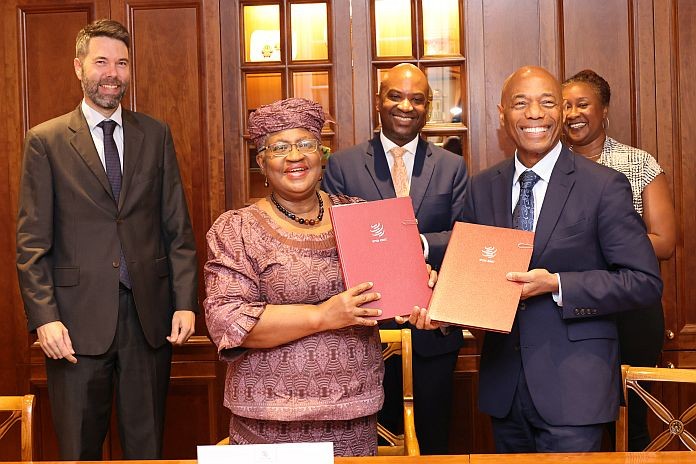BRIDGETOWN, Barbados – Following a declaration to global players that we reassess and revolutionize existing trading arrangements to increase opportunities for Small Island Developing States (SIDS), the president of the Caribbean Development Bank (CDB), Dr Hyginus ‘Gene’ Leon signed a new agreement with World Trade Organization (WTO).
The Memorandum of Understanding (MOU) will strengthen ties between the WTO and CDB and aims to improve capacity, accessibility and availability of trade resources to members of both organisations.
Dr Leon speaking at the signing on October 25, in Geneva highlighted the prospects for the bank’s 19 Borrowing Member Countries:
“This agreement opens doors and expands opportunities for the Caribbean to increase trade, build prosperity and safeguard economic resilience. The latter is significant given the existing high reliance on exports and our acute vulnerabilities,” he said.
WTO director-general Ngozi Okonjo-Iweala who signed the MOU said:
“The MOU aims to deliver specific things for the benefit of countries in the region, virtually all of whom are members of the WTO. So, for instance, as part of a food security package how can we work together to make sure that the Fisheries Subsidies Agreement is implemented? How do we collaborate on capacity building on fisheries management, how do we get countries to deposit their instruments of acceptance [for the Fisheries Subsidies Agreement] as quickly as possible and how do we work together on gender and trade, including collaboration with ITC.”
The agreement will increase cooperation and collaboration in trade facilitation and the implementation of the WTO’s Trade Facilitation Agreement (TFA) and its Agreement on Fisheries Subsidies. It also seeks to accelerate ongoing and future initiatives to reduce Technical Barriers to Trade (TBT), address Sanitary and Phytosanitary issues and create mechanisms for the agencies to partner to improve capacity building, technology, data and knowledge transfer in tourism, education, culture and entertainment, and professional health and wellness while leveraging technology, public policy support, and innovation.





